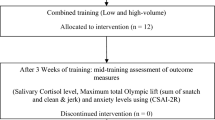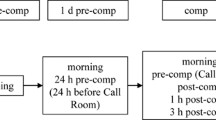Abstract
The purpose of this study was to investigate the effect of weight reduction prior to a competition on the salivary cortisol level for first-rate judo players. Subjects were divided into three groups by the weight reduction rate. On the day before the competition, the cortisol levels of the low- and high-weight reduction group showed a tendency to decrease and were significantly lower than that of the non-weight reduction group (p<0.05). However, with regard to the change in the stress indices, there was a difference between the high- and low-weight reduction groups. In the high-weight reduction group alone, there was a significant increase in the stress indices on the day before the competition (p<0.05). These findings suggest that the HPA axis is affected during the relatively early stage of weight reduction and mental stress is increased at the higher weight reduction rate.
Similar content being viewed by others
References
Morimoto K, “Stress-kiki no yobo-igaku” (in Japanese). Tokyo: NHK books 1997.
Tharp GD, Barnes MW. Reduction of saliva immunoglobulin levels by swim training. Eur. J. Appl. Physiol. 1990; 60: 61–64.
Urhausen A, Kindermann W. Behaviour of testosterone, sex hormone binding globulin (SHBG), and cortisol before and after a triathlon competition. Int. J. Sports Med. 1987; 8: 305–308.
Steinacker JM, Laske R, Hetzel WD, Lormes W, Liu Y, Stauch M. Metabolic and hormonal reactions during training in junior oarsmen. Int. J. Sports Med. 1993; 14: S24–28.
Yanovski JA, Yanovski SZ, Gold, PW, Chrousos GP. Differences in corticotropin-releasing hormone-stimulated adrenocorticotropin and cortisol before and after weight loss. J. Clin. Endocrinol. Metab. 1997; 82: 1874–1878.
Scavo D, Barletta C, Buzzetti R, Vagiri D. Effects of caloric restriction and exercise on B-endorphin, ACTH and cortisol circulating levels in obesity. Physiol. Behav. 1988; 42: 65–68.
Yamaguchi M, Takai N. Saliva as a mirror of the body (in Japanese). Tokyo; Kougyou-chousakai, 1999.
Kirschbaum C, Hellhammer DH. Salivary cortisol in psychoneuroendocrine research: recent developments and applications. Psychoneuroendocrinology 1994; 19: 313–333.
Kirschbaum C, Hellhammer DH. Salivary cortisol in psychobiological research: an overview. Neuropsychobiology 1989; 22: 150–169.
Shimada M, Takahashi K, Ohkawa T, Segawa M, Higurashi M. Determination of salivary cortisol by ELISA and its application to the assessment of the circadian rhythm in children. Horm. Res. 1995; 44: 213–217.
Goldberg DP. Mannal of the General Health Questionnaire. Windsor; NFER Publishing, 1978.
Zung WWK. A self-rating depression scale. Arch. Gen. Psychiatry 1965; 12: 63–70.
Fukuda K, Kobavashi S. The Japanese version of the SDS (in Japanese) Kyoto; Sankyobo, 1983.
Kurakake S, Umeda T, Nakaji S, Sugawara K, Saito K, Yamamoto Y. Changes in physical characteristics, hematological parameters and nutrients and food intake during weight reduction in judoists. Environ. Health Prev. Med. 1998; 3: 152–157.
Åkerstedt T, Levi L. Circadian rhythms in the secretion of cortisol, adrenaline and noradrenaline. Eur. J. Clin. Invest. 1978; 8: 57–58.
Kirschbaum C, Gonzalez BE, Rohleder N, Gessner C, Pirke KM, Salvador A, Hellhammer DH. Effects of fasting and glucose load on free cortisol responses to stress and nicotine. J. Clin. Endocrinol. Metab. 1997; 82: 1101–1105.
Booth A, Shelley G, Mazur A, Tharp G, Kittok R. Testosterone, and winning and losing in human competition. Horm. Behav. 1989; 23: 556–571.
Munck A, Guyre PM, Holbrook NJ. Physiological functions of glucocorticoids in stress and their relation to pharmacological actions. Endocr. Rev. 1984; 5: 25–44.
Florini JR. Hormonal control of muscle growth. Muscle Nerve 1987; 10: 577–598.
Perna FM, Antoni MH, Kumar M, Cruess DG, Schneiderman N. Cognitive-behavioral intervention effects on mood and cortisol during exercise training. Ann. Behav. Med. 1998; 20: 92–98.
Perna FM, McDowell SL. Role of psychological stress in cortisol recovery from exhaustive exercise among elite athletes. Int. J. Behav. Med. 1995; 2: 13–26.
Author information
Authors and Affiliations
Corresponding author
Rights and permissions
About this article
Cite this article
Toda, M., Morimoto, K., Fukuda, S. et al. The effect of the weight reduction on the salivary cortisol levels of judo players. Environ Health Prev Med 6, 113–116 (2001). https://doi.org/10.1007/BF02897956
Received:
Accepted:
Issue Date:
DOI: https://doi.org/10.1007/BF02897956




